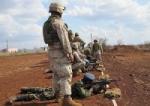Aid workers are struggling to find safer ways to deliver aid to displaced and vulnerable families in Baghdad. The city, which is now effectively divided along religious lines, is increasingly under the control of armed gangs and is seen by aid agencies as the most dangerous place in Iraq in which to operate.
"We don't have freedom to deliver aid to displaced families," Fatah Ahmed, vice-president of the Iraqi Aid Association (IAA), said. "Unfortunately, we have to choose which families to help taking into account the safety of our volunteers."
"Sunni volunteers are being sent to Sunni neighbourhoods and Shia to Shia areas," he added.
Ahmed recently became vice-president of the IAA after Jamal Hussein, the former vice-president, was killed while delivering aid in a Baghdad suburb.
"He was killed because he was a Shia helping Sunni families. For this reason we prefer to send volunteers to areas where at least they can be welcomed," he said.
According to Mayada Marouf, a spokesperson for the locally-based group Keeping Children Alive (KCA), local aid agencies have rated neighbourhoods according to their safety, leaving the most dangerous areas to be covered by the Ministry of Displacement and Migration.
"Dora, Sadr City, Adhamiyah, Alawi, Batawin, Hayfa and Hurryia are the most dangerous places," Mayada said.
"We had to stop using cars with emblems of our aid organisation to prevent us being targeted," she said. "We have to carry the supplies in small cars making many trips, each time taking a different route."
Mayada and Ahmed agreed that Baghdad had never been so violent, and aid had never been so hard to deliver. They said many local non-governmental organisations (NGOs) had stopped their operations after being targeted ...







Bookmarks